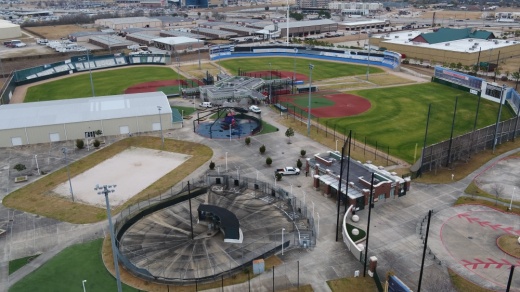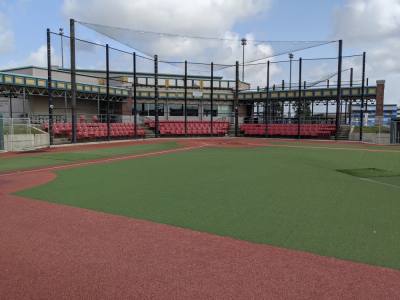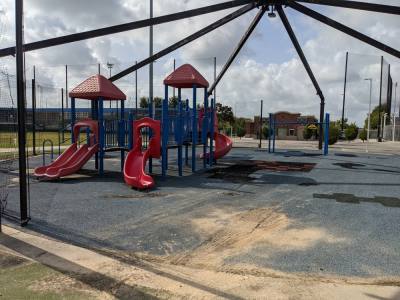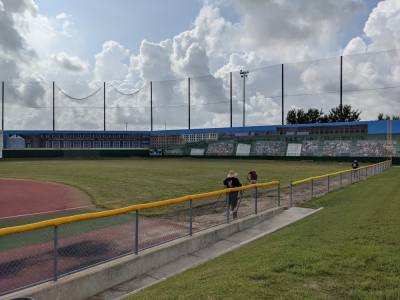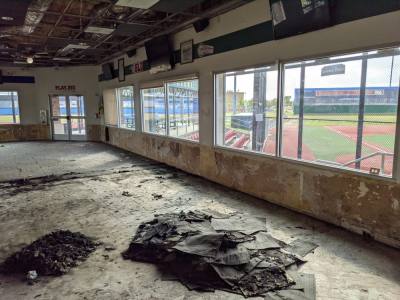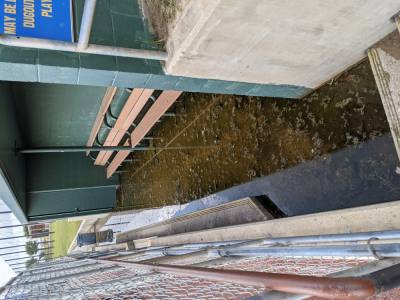The sports facility at Calder Road and Big League Dreams Parkway will reopen in December, alleviating some of the demand for athletic fields League City officials said they have heard for years.
“It’s a pretty significant impact to the sports culture here in League City,” City Manager John Baumgartner said of the facility and its users. “They’ve all been struggling to find places to play.”
The complex, which closed unexpectedly in January, offers six baseball fields for adults and children to play on. The city—which owns the facility and leased it to the operator, Big League Dreams—terminated the 17-year contract between the two entities after Big League Dreams defaulted on payment and failed to address numerous maintenance issues.
When Big League Dreams reopens in December under a new operator, it will come with upgrades.
In the meantime, League City is still feeling the demand for sports fields. Young athletes are turned away from joining summer sports teams every year due to a lack of fields on which they can practice and play, city officials and residents said.
In 2020, the city hired a consultant, TBG Partners, to design Bay Colony Park, which will include several sports fields near the southwest corner of Calder Road and Ervin Street. The consultant was told to redesign the park after League City City Council in August shot down a $38 million park design that did not include enough fields.
Meanwhile, the supply of fields is not growing fast enough for some.
“We know it takes longer than any of us want it to,” Baumgartner said.
Facility upgrades
After Big League Dreams closed, a few companies expressed interest in operating the facility. However, city staff and City Council decided this summer to again choose Big League Dreams—now under new ownership—to operate the facility.
In 2020, TC Sports Group began the process to buy out Big League Dreams, which has about 10 locations across the country. With the buyout complete, the company has already made upgrades at other locations, and there are similar plans in the works for the League City location, officials said.
The new operators will invest about $2 million in upgrades and maintenance to the facility. Upgrades include remodeling the facility’s two restaurants, replacing the outfield graphics of audience members, installing new seating and netting, and fixing the playground, officials said.
“We’ve already started ... to restore Big League Dreams League City to the standards that should have been and beyond and make it one of the best sports facilities in the country,” Chief Operating Officer Kevin Flora said.
The biggest upgrade will be to the infield turf. Some of the turf has not been replaced since the facility opened around 2004, Flora said; turf has been worn down and patched over, and weeds are growing through some areas.
Turf technology has since improved, so Big League Dreams is investing in installing new turf, Executive Vice President Joe Giansante said.
“Having elite fields is really paramount to the entire operation,” he said.The company has plans to expand what the facility offers as well. For instance, the facility’s 20,000-square-foot soccer pavilion could become the site of dog shows as well as cheerleading and dance camps and competitions, Flora said.
Big League Dreams saw 300,000 visitors annually before it closed, and the new operators are hoping its popularity will continue.
“[Such] events will bring a lot of spectators ... and help drive the economic development there,” Flora said. “We’re just happy to get their fields [in good condition] to start playing again.”
A ‘better deal’
League City Council Member Nick Long, whose children played baseball at Big League Dreams, said he brought concerns about the park’s condition to the city last year.
Long noticed the park had several maintenance problems that had not been addressed and had become safety issues, including loose or missing netting, damaged turf and other concerns, he said.
After investigating, Long discovered the contract the city had with Big League Dreams did not benefit the city much. The city pays over $1 million annually for debt on the facility, but under the previous contract, the city received only about $280,000 annually in revenue from the facility. That means the difference was being subsidized by taxpayers, Long said.
“The contract was terrible,” he said. “It was one of the worst-looking deals imaginable.”
Council Member Chad Tressler, who also has a son who played baseball at the facility, agreed.
“Financially, all the benefit was for the operator, and all the risk went on the city, essentially,” he said. “If they ran it poorly, we got nothing.”
The contract also did not include many conditions under which the city could back out of the agreement, Long said. However, the operator defaulting on payment did allow League City to annul the contract. Big League Dreams failed on more than one occasion to pay the city money owed under the contract, allowing the city to terminate the agreement.
Finding a new operator allowed the city to make a better contract drafted by city attorneys. Under the new contract, the city will collect at least as much money as the city owes in debt on the facility, officials said.
Additionally, it is easier for League City to cancel the contract. After five years, League City can annul the contract for any reason, Long said.
Despite the new operator being of the same name as the old one, city officials said they have higher hopes this time around. City staff has investigated what upgrades the new operator has done at other Big League Dreams facilities and found them satisfactory, Long said.
“I do feel these new owners are more experienced and more serious about keeping this place first class,” he said.
Bay Colony Park
The reopening of Big League Dreams is not the only upcoming relief for local athletes.
Due to the demand for sports fields in League City, the city hired TBG Partners to design a new sports park dubbed Bay Colony Park. On Sept. 14, TBG Partners presented a stripped-down version of the park for $21 million, and City Council and staff will work in the coming weeks on deciding what amenities are worth the cost.
Baumgartner said League City has room for a lot of development and growth on the southwest side, and 100 to 200 acres of that will be set aside for potential sports fields.
“We’re a growing community, so we’re going to have to continue to develop that to keep up,” he said.




